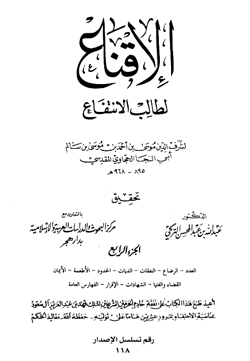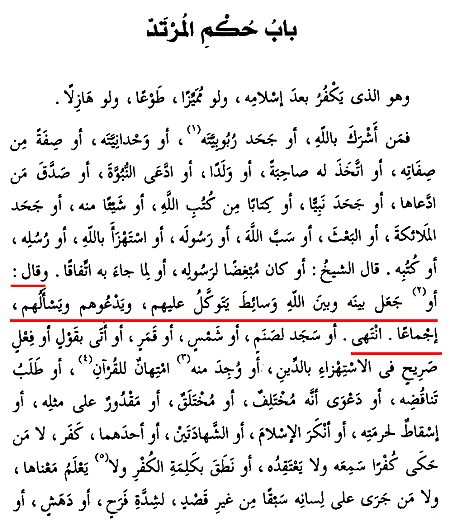Wahhabis.Com
Posted by Abu.Iyaad on Thursday, August, 25 2011 and filed under General

 Quote, "The book al-Iqnaa' li Taalib al-Intifaa' is book of great status, mighty in benefit, in which the author (rahimahullaah) has abstracted that which is authentic (saheeh) from the madhhab of Imaam Ahmad, and no one has authored a work like it in the extensiveness of citation, and discussion of issues. So this book came - alongside its brevity - combining all the foundations and subsidiary (branches) of the madhhab upon a single statement (in each issue), which is that given preference by the people of thorough investigation fom the Scholars of the madhhab. And the author mentioned his methodology when he authoried his book in the introduction when he says:, "To proceed, this is a book on the fiqh upon the madhhab of the Imaam of the imaams, the illuminator of the gloominess of the pitch-black difficulties (of the era), the scholarly ascetic, the second siddeeq [after Abu Bakr], Abu Abd Allaah Ahmad bin Muhammad bin Hanbal al-Shaybani, may Allaah be pleased with him..." - from the introduction of the 1423H, 3rd edition tahqeeq of Abd Allaah bin Abd al-Muhsin al-Turkee.
Quote, "The book al-Iqnaa' li Taalib al-Intifaa' is book of great status, mighty in benefit, in which the author (rahimahullaah) has abstracted that which is authentic (saheeh) from the madhhab of Imaam Ahmad, and no one has authored a work like it in the extensiveness of citation, and discussion of issues. So this book came - alongside its brevity - combining all the foundations and subsidiary (branches) of the madhhab upon a single statement (in each issue), which is that given preference by the people of thorough investigation fom the Scholars of the madhhab. And the author mentioned his methodology when he authoried his book in the introduction when he says:, "To proceed, this is a book on the fiqh upon the madhhab of the Imaam of the imaams, the illuminator of the gloominess of the pitch-black difficulties (of the era), the scholarly ascetic, the second siddeeq [after Abu Bakr], Abu Abd Allaah Ahmad bin Muhammad bin Hanbal al-Shaybani, may Allaah be pleased with him..." - from the introduction of the 1423H, 3rd edition tahqeeq of Abd Allaah bin Abd al-Muhsin al-Turkee.
As for the author of this Hanbali fiqh manual, he is the Shaykh, Imaam and Allaamah, Musa bin Ahmad bin Musa bin Saalim bin Ahmad bin Eesaa bin Saalim Sharaf al-Din Abu al-Najaa al-Hajjaawiyy al-Maqdisi, al-Saalihee, the muftee of the Hanbalis in Damascus, and the one depended upon in matters of jurisprudence in the lands of Shaam, and he was the Shaykh of Islaam therein... His teachers include Shihab al-Din al-Shuwaykiyy (d. 939H), muftee of the Hanbalis in Damascus, author of "al-Tawdih Fi al-Jam' Bayn al-Muqni' wal-Tanqeeh". Also, Muhibb al-Deen al-Uqaylee, a khateeb of al-Masjid al-Haram (Makkah) (d. 916H). Also Ibn al-Deewaan, Shihab al-Deen Ahmad bin Muhammad (d. 940H), imaam of the grand mosque of the Hanbalis in Damascus for thirty-odd years. Also Najm al-Din Umar bin Muflih (d. 919H), the author of "al-Furoo'". Also Kamal al-Din al-Husaynee (d. 933H) who was one of the greater scholars, he took over the position of iftaa (giving fatwaa) at the House of Justice in Damascus, and he granted al-Hajjaawiyy an ijaazah to narrate through his teachers with respect to forty hadeeths.
 Al-Hajjaaawi said under the chapter heading of "Chapter Pertaining to the Ruling of the Apostate", the following:
Al-Hajjaaawi said under the chapter heading of "Chapter Pertaining to the Ruling of the Apostate", the following:
"So whoever associated partners with Allaah or rejected (jahada) His Rububiyyah (creatorship, ownership of the universe), or His Wahdaniyyah (sole right to be worshipped alone) or an attribute amongst His attributes, or took for Him a wife or son, or claimed prophethood,or believed the one who claimed it, or rejected a prophet (amongst the prophets of Allaah), or a book from the books of Allaah, or anything from them, or rejected the Angels, or the resurrection, or who reviled Allaaah, or His Messenger, or mocked Allaah or His Messengers or His books. The Shaykh said: Or who hated His Messenger or what he came with, by agreement (of the scholars). And he said: Or who set up between himself and Allaah intermediaries, relying upon them, invoking them and asking them, by consensus. End (quote). Or who prostrated to an idol, or to the sun or to the moon..."
Points and Notes
The first: Refutation of the claim that Shaykh Muhammad bin Abd al-Wahhaab brought a new doctrine never known before. Rather, this is what the Prophet's and Messengers came with, the call to singling out Allaah in worship and the shunning of worship besides them. When Shirk started become widespread in the Ummah and people flocked to the graves the Scholars made not of that and spoke about it, and from them, Ibn Aqil, Ibn al-Jawzee, Fakhr al-Din al-Razi (see here), Ibn Taymiyyah, and others.The second: This is a matter of ijmaa' (consensus) in the madhhab as corroborated by the most learned of the Hanbalite jurists of the time who were alive a century before Shaykh Muhammad bin Abd al-Wahhaab was even born, and who themselves were preceded in this takfir of the one who took others for worship besides Allaah by the likes of Ibn Aqeel (d. 513H) and Ibn al-Jawzee (d. 597H) by another three centuries.
The third: Spuriousness of the claim that Shaykh Muhammad bin Abd al-Wahhaab exited from the domain of the four madhhabs, this is plain falsehood and academic fraud.
The fourth: Exposition and unveiling of the new fake "Hanbalis", who are Ash'ari-Sufi-Mufawwidhah in reality, but who are trying to push their doctrines by wearing the cloak of Hanbali fiqh. They are actually hypocrites (in action), and the mere fact that they vilify Shaykh Muhammad bin Abd al-Wahhab and claim adherence to the Hanbali fiqh at the same time exposes them as liars and deceivers from the very outset. Claiming attachment to the Hanbali madhhab and then vilifying Shaykh Ibn Abd al-Wahhaab for declaring as Shirk the setting up of intermediaries with Allaah, calling upon them, and directing worship to them (a matter of ijmaa' in the madhhab) are two diametrically opposed affairs. It is a contradiction to claim association with the Hanbali fiqh and find fault with Shaykh Muhammad bin Abd al-Wahhaab's call to the Tawhid of the Messengers.